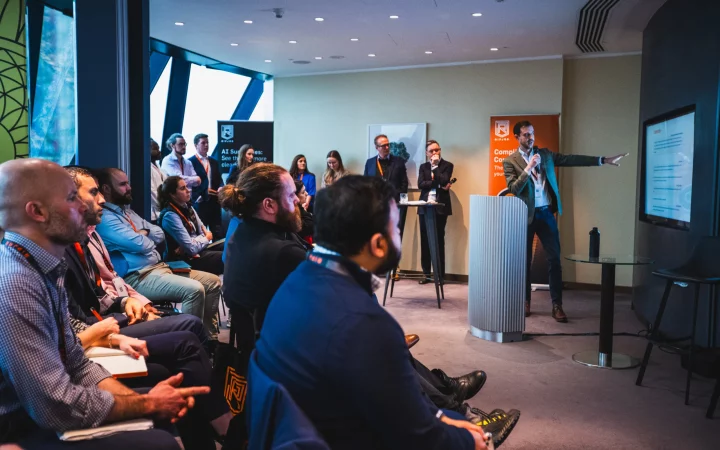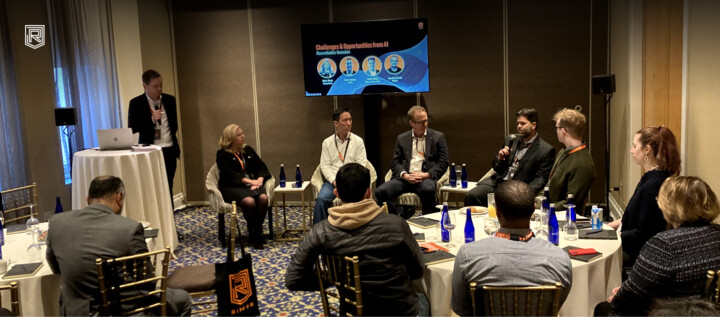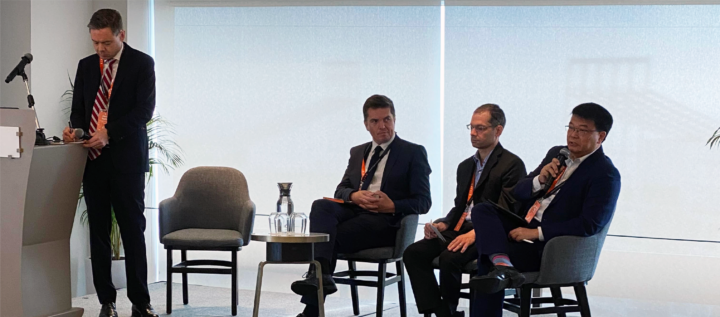In October 2022, the Australian Institute of Professional Intelligence Officers (AIPIO) hosted the Intelligence International 2022 conference in Melbourne, Australia. The theme of the conference was “collaboration in a complex world”, with AIPIO bringing together a diverse group of leaders, professionals, and academics from across the intelligence community, for panel sessions, networking events, exhibitions, and keynote presentations.
Ripjar’s Brent Osmotherly, Delivery Lead for Ripjar Australia, was invited to participate in a panel entitled Public-Private Perspectives on the Collection-Analysis Paradox, along with other intelligence experts from leading financial, technology, and media organisations. In keeping with the theme of the conference, the panel discussed the dilemma – or ‘paradox’ – that intelligence analysts face when dealing with data: should organisations focus more on the collection or analysis of data?

Panel chair, Brett Peppler, Managing Director of Intelligence Futures, characterised the collection-analysis problem as “socio-cultural”, but suggested that it would be best solved by working from “multiple perspectives”, including those of technology experts such as those invited to the panel. The discussion took in a wide range of industry perspectives, exploring issues such as how to manage the downsides of a decision to focus on either collection or analysis, and how the problem is being tackled by organisations in different global jurisdictions.
The panel explored the following key questions and topics:
What are the main industry concerns with the collection-analysis paradox?
The paradoxical relationship between the collection and analysis of data means that the more data that is collected, the less time and resources are available for its analysis (and vice versa). Intelligence analysts must make a choice whenever they deal with data, which necessarily involves a downside: either less data available for analysis, or less time spent on that analysis.
The panel identified several specific concerns about the dilemma. Brent Osmotherly suggested that, while firms must first ensure they have enough data in the first place to generate useful intelligence, the issue was also about “empowering analysts” to optimise that data. That notion was echoed by the other speakers who referenced the need to ensure easy access to data, to be able to rely on suitable technology to make sense of it, and to facilitate more cooperation between law enforcement agencies and private sector business.
How is the collection-analysis paradox handled in different international jurisdictions?
The panel included experts from Australia and from Europe and Asia, which brought a diversity of experience to the discussion. The panellists emphasised that while there are a range of approaches to the collection-analysis paradox, the challenges for individual organisations are essentially the same in every part of the world: namely, the need for efficiency and speed in both collection and analysis.
Michael Le Huy, Visual Analysis General Manager, suggested that an organisation’s success with data often depends on their level of maturity when dealing with it, and their ability to use the intelligence that they derive from it to support law enforcement. Steve Hebble, Director of Marketing at Sintelix, stressed the importance of geography as a factor in how firms are able to manage data, pointing out that smaller population countries often have much better access to data thanks to their ability to localise it as a resource while larger countries, such as Australia, face administrative challenges as a result of having to coordinate data between numerous national legislative bodies.
BC Tan, Director of Risk Solutions at Thomson Reuters, cited Singapore as an example of a small country managing its data responsibilities, discussing the city-state’s development of a state-of-the-art national risk and horizon scanning platform. Tan pointed out that the platform has not only helped Singapore add speed and efficiency to its data processing needs but has had the added benefit of helping to align the collection-analysis problem with the goals of policymakers. More specifically, by implementing the platform, Singapore has been able to identify overlaps between the capabilities of private sector and government bodies, further enhancing the way it collectively deals with data.
What is the intelligence community going to do about the collection-analysis paradox?
The collection-analysis paradox isn’t going away, but the panel discussed ways that firms could put themselves in the best position to meet the challenge going forward. Bernard Rix of PolicingTV talked about the need to move beyond public-private siloed approach to data – a sentiment echoed by the other panellists who all stressed the importance of collaboration in data processing environments.
Gerald Berkovics, VP of Sales for Cellebrite, took that notion further, suggesting that collaboration, not only between collectors and analysts, but between the public and private sectors will be crucial to managing the increasing volume and complexity of data in the future. Berkovics explained that this level of collaboration would mean finding ways to better sync the work of intelligence employees: analysts should know what data can be collected, and conversely, collectors should know how data is used by analysts. Gerald also stressed the importance of data volume, and the need to collect enough to account for changes on the risk landscape: “The world is changing very fast. You don’t always know what questions you want to ask. Who would have thought that two or three years ago they would have Covid? Or that Russia would be in Ukraine?”
Brent Osmotherly also urged firms to “embrace the volume” as a way to manage their collection-analysis challenge and “identify the bits of information that are relevant for you.” For example, Ripjar’s Labyrinth platform may process “three or four million documents a day… across 22 languages”, but after that data is refined “less than 1%” might remain relevant as actionable intelligence. Brent emphasised that ongoing monitoring is also key to the collection-analysis challenge: firms must be able to maintain that level of performance on a daily basis in order to get the most out of the data they collect.
To learn more about how Ripjar can help you tackle the data collection-analysis challenge, get in touch today.
Last updated: 31 December 2024





